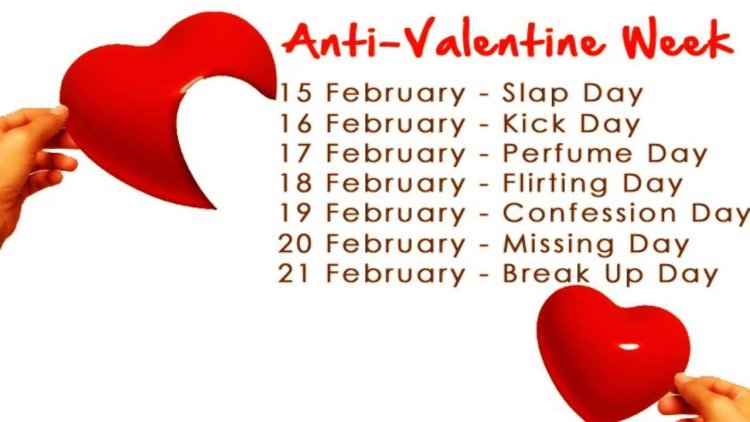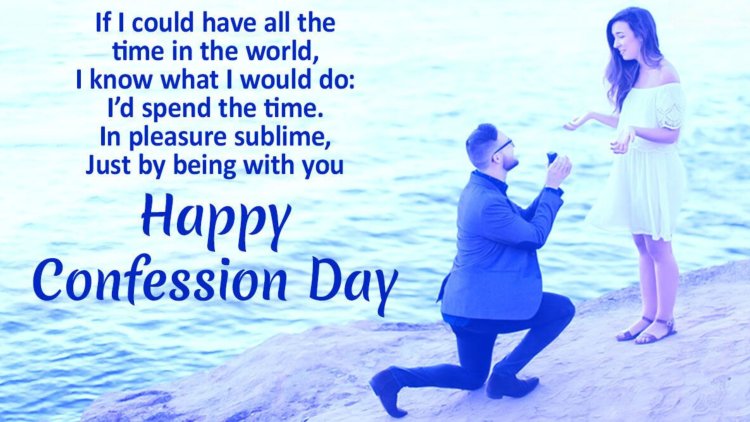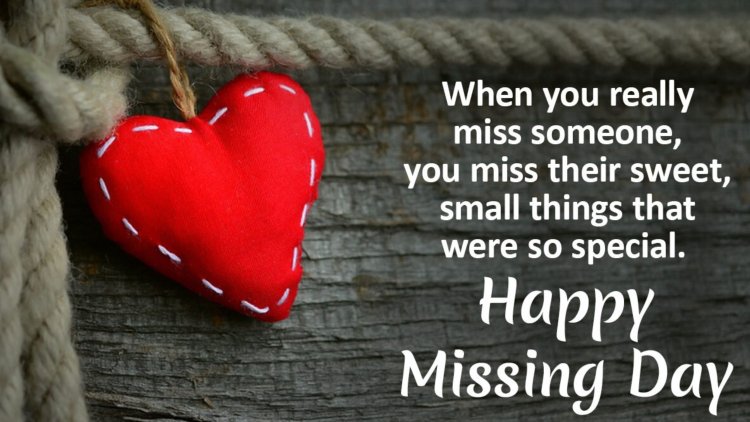From Slap Day to Break-up Day: Did you know about the Anti Valentine's Week (February 15th to February 21st)
Beyond Hearts and Roses: Exploring the Unconventional Charm of Anti-Valentine's Week Every year, the air buzzes with anticipation leading up to February 14th. Valentine's Day, with its roses, chocolates, and romantic gestures, paints a specific picture of love and affection. But what about those who don't resonate with that picture? Enter Anti-Valentine's Week, a playful and sometimes subversive counterpoint celebrated immediately after, from February 15th to 21st.

This quirky celebration isn't about negativity or anti-love. It's a tongue-in-cheek acknowledgment that love comes in many forms, and not everyone's story fits the traditional Valentine's Day narrative. Anti-Valentine's Week provides a space for singles, heartbroken souls, and even those in happy relationships to embrace a wider spectrum of emotions and experiences.
Let's delve into the seven unique days that make up Anti-Valentine's Week, exploring their origins, significance, and various ways to celebrate:

1. Slap Day (February 15th): Don't worry, the "slap" here is metaphorical! This lighthearted day is seen as an opportunity to playfully express disapproval or frustration towards a friend, colleague, or even an ex (in a harmless and friendly way, of course). It's not about violence, but a chance to address grievances humorously or release pent-up emotions constructively.
2. Kick Day (February 16th): Building on the playful theme, Kick Day encourages symbolically "kicking out" bad habits, negative influences, or anything holding you back in life. It's a chance to break free from limitations, embrace positivity, and move forward with renewed energy.
3. Perfume Day (February 17th): This day serves as a self-love reminder. Treat yourself to that luxurious perfume you've been eyeing or indulge in a fragrant spa day. Perfume Day highlights the importance of appreciating yourself and radiating confidence, regardless of relationship status.
4. Flirt Day (February 18th): Feeling adventurous? Flirt Day encourages you to unleash your inner charmer and have some lighthearted fun. Whether it's playful banter with a crush, friendly flirting with new acquaintances, or even reigniting the spark in a long-term relationship, this day is about celebrating the joy of playful connection.
5. Confession Day (February 19th): Whether you've harbored secret feelings for someone or want to clear the air about a misunderstanding, Confession Day provides a platform to voice your heart (metaphorically, of course). However, remember to be responsible and respectful, keeping the other person's feelings in mind.
6. Missing Day (February 20th): Not all emotions during Anti-Valentine's Week are lighthearted. This day allows you to acknowledge and embrace feelings of missing someone, be it a lost love, a deceased friend, or a family member far away. It's a day for reflection, reminiscing, and cherishing the memories we hold dear.
7. Breakup Day (February 21st): The final day serves as a reminder that not all relationships are meant to last. Breakup Day doesn't celebrate breakups per se, but acknowledges that they are a natural part of life and an opportunity for personal growth. It encourages acceptance, healing, and moving forward with strength and optimism.
While the playful intentions of Anti-Valentine's Week are clear, it's important to remember the line between lighthearted fun and disrespect. The celebration should never target specific individuals or promote harmful emotions.
The beauty of Anti-Valentine's Week lies in its diversity. Whether you're single, heartbroken, happily coupled, or simply enjoy celebrating unconventional forms of love and self-expression, this week offers something for everyone. It's a time to step outside the traditional romantic narrative, acknowledge a wider range of emotions, and embrace the multifaceted nature of love and life.
Beyond the Dates: Understanding the Cultural Significance
While primarily observed in India and some South Asian countries, Anti-Valentine's Week has sparked interest globally. It reflects a growing trend of individuals seeking alternative expressions of love and self-love, moving beyond the commercialized aspects of Valentine's Day. This week also highlights the evolving definition of relationships in contemporary society, where individuality and emotional well-being hold equal importance to romantic love.
Criticisms and Considerations
It's important to acknowledge certain criticisms surrounding Anti-Valentine's Week. Some argue that it promotes negativity and undermines the value of romantic love. Others express concerns about the potential for misuse, particularly on days like "Slap Day" or "Kick Day."
Here's the key: It's all about understanding the spirit of the celebration. When approached with humor, respect, and self-awareness, Anti-Valentine's Week can be a fun and meaningful experience. Ultimately, it's up to each individual to decide how to participate, if at all. The core message lies in acknowledging that love doesn't have a singular definition, and embracing the various forms it takes in our lives.
Embracing the Anti-Valentine Spirit: Activities and Ideas
Now that we've explored the essence of Anti-Valentine's Week, let's get creative! Here are some ideas for participating in each day according to its unique theme:
Slap Day: Organize a lighthearted game of "Tag, You're Out" with friends, where you playfully "tag" each other with funny compliments or challenges. You can even write and exchange anonymous notes with constructive feedback (delivered respectfully, of course!).

Kick Day: Channel your inner athlete and participate in a fitness challenge with friends. Alternatively, create a list of bad habits you want to "kick" and share your progress for accountability. You can even have a symbolic bonfire ritual, writing down negative influences you want to leave behind.

Perfume Day: Indulge in a DIY spa day, making your own bath salts or aromatic masks. Host a fragrance swap with friends, or simply treat yourself to that special perfume you've been eyeing. Don't forget to appreciate your unique scent and the confidence it radiates!

Flirt Day: Strike up conversations with new people at a coffee shop or park. Challenge yourself to compliment three strangers genuinely. Have a playful texting exchange with a crush or reignite the spark with your partner through flirty messages or games.

Confession Day: Write a letter to your future self expressing your hopes and dreams. Confess your love for a hobby or passion you've neglected. If you have someone special in mind, gather the courage to confess your feelings (remembering respect and responsibility).

Missing Day: Create a memory box filled with cherished photos and mementos of someone you miss. Write a heartfelt letter expressing your emotions, even if you don't plan to send it. Connect with friends or family who share your memories for a supportive chat.

Breakup Day: Organize a "letting go" ritual, symbolically releasing past hurts and negative experiences. Write farewell letters to old habits or limiting beliefs. Celebrate your personal growth and newfound strength with friends or do something empowering for yourself.
Remember, these are just suggestions! Feel free to adapt them to your own preferences and create unique ways to celebrate each day of Anti-Valentine's Week.
Beyond the Individual: Building Community and Connection
While Anti-Valentine's Week encourages self-reflection and individual expression, it can also be a space for building community and connection. Organize an Anti-Valentine's potluck with friends, where everyone brings a dish representing their unique approach to the week. Host a game night focused on board games celebrating friendship and laughter. Participate in volunteering activities or donate to causes you care about, spreading love and compassion beyond romantic relationships.
A Celebration of Self-Love and Acceptance
Ultimately, Anti-Valentine's Week is a reminder that love and happiness come in many forms. It's a chance to embrace self-love, celebrate non-traditional forms of connection, and acknowledge the full spectrum of emotions that make us human. Whether you're single, coupled, or somewhere in between, this week allows you to step outside the box and appreciate the diverse ways love enriches our lives. So, go forth, have fun, and explore the unique charm of Anti-Valentine's Week!
Global Variations of Anti-Valentine's Week: A Voyage Beyond Roses and Chocolates
While primarily celebrated in India and parts of South Asia, the spirit of Anti-Valentine's Week is resonating in more corners of the globe. Each country adapts it to its unique cultural context, resulting in fascinating variations and traditions. Let's embark on a journey to explore how different corners of the world celebrate this unconventional week:
1. Brazil: Here, Anti-Valentine's Week takes on a more festive and romantic twist. February 12th is celebrated as "Singles' Day," where singles gather for parties and events dedicated to friendship and fun.
2. South Korea: The "Black Day" on April 14th serves as an unofficial Anti-Valentine's Day for those still single after Valentine's Day. People traditionally eat black noodles, symbolizing acceptance and resilience.
3. China: "Singles' Day" on November 11th, also known as "Double Eleven," has transcended its retail roots and become a day for singles to celebrate themselves and enjoy consumer treats.
4. Philippines: February 13th is "Singles Awareness Day," with friends and families getting together for outings and celebrations, emphasizing community and platonic love.
5. Japan: March 14th, also known as "White Day," serves as a response to Valentine's Day, where men traditionally reciprocate gifts received from women.
Unique Traditions and Names:
Beyond these national examples, diverse traditions bloom within each country:
- Thailand: "Slap Kiss Day" involves playful cheek-kisses to single friends on February 14th.
- South Korea: "Perfume Day" is called "Black Day," reflecting the darker theme of the tradition.
- Indonesia: "Galentine's Day" celebrates female friendships and empowers single women.
Cultural Context Matters:
Understanding the cultural context is crucial to appreciating the diverse interpretations and celebrations:
- Collectivistic cultures: In countries like South Korea or Japan, where community holds greater importance, the focus may be on celebrating friendship and singles' support systems.
- Individualistic cultures: In Western nations like the US, the emphasis might be on self-love, empowerment, and challenging societal expectations around romantic relationships.
- Religious beliefs: Cultural and religious views on love, relationships, and self-expression influence how people approach Anti-Valentine's Week celebrations.
While the core message of Anti-Valentine's Week - embracing diverse forms of love and self-expression - remains constant, its global journey reveals fascinating cultural adaptations. Exploring these variations expands our understanding of love's multifaceted nature and reminds us that celebrations aren't bound by rigid traditions but evolve with the unique contexts that embrace them.
Unveiling the Psyche: Psychological Benefits and Drawbacks of Anti-Valentine's Week
Anti-Valentine's Week, with its unconventional approach to love and relationships, offers a platform for psychological exploration. Let's delve into the potential benefits and drawbacks of participating in this unique celebration:
Potential Benefits:
- Emotional Processing: For those experiencing heartbreak, loneliness, or societal pressure regarding relationships, Anti-Valentine's Week can provide a safe space to express pent-up emotions. "Missing Day" allows for reflection and grief, while "Kick Day" symbolically helps release negativity.
- Challenging Societal Expectations: This week serves as a gentle rebellion against the hyper-commercialized narrative of Valentine's Day. It empowers individuals to define love and celebrate connections beyond traditional parameters, promoting individuality and self-worth.
- Promoting Self-Acceptance: Days like "Perfume Day" and "Flirt Day" encourage self-love and appreciation, while "Confession Day" can facilitate self-reflection and acceptance of imperfections. This can combat low self-esteem and promote internal validation.
- Strengthening Non-Romantic Bonds: The focus on platonic love and friendship through days like "Slap Day" and "Singles Awareness Day" reinforces the importance of non-romantic connections, fostering a sense of belonging and community.
Potential Drawbacks:
- Negativity and Cyberbullying: While playful intentions are encouraged, "Kick Day" and "Slap Day" could potentially be misused for negativity or cyberbullying, especially online. Responsible participation and respect are crucial.
- Exacerbating Loneliness: For individuals already struggling with loneliness or isolation, the contrast between Valentine's Day celebrations and Anti-Valentine's Week's themes might inadvertently amplify negative feelings. It's important to practice self-compassion and focus on positive aspects of the week.
- Pressure to Conform: While challenging societal norms is celebrated, some might feel pressured to participate in ways that don't resonate with them. It's essential to engage authentically and avoid feeling obligated to follow specific traditions.
- Commercialization: Even Anti-Valentine's Week isn't entirely immune to commercialization. Be mindful of marketing messages and prioritize genuine self-expression and connection over consumerism.
Balancing the Equation:
Ultimately, the psychological impact of Anti-Valentine's Week depends on individual perspectives and participation styles. By approaching it with awareness, respect, and a focus on personal growth, individuals can leverage the benefits while mitigating potential drawbacks. Whether you use it for emotional processing, self-celebration, or simply lighthearted fun, remember that the real value lies in exploring love and connection in ways that resonate with you.
Anti-Valentine's Palette: Expressions of Love Beyond Roses
The spirit of Anti-Valentine's Week ignites creativity, inspiring artistic expressions that challenge traditional romantic narratives and celebrate diverse forms of love and self-affirmation. Let's explore how artists across different mediums capture the essence of this unconventional week:
Literature:
- Poetry: Authors like Rupi Kaur and Amanda Lovelace write powerful poems exploring self-love, heartbreak, and societal expectations around relationships.
- Novels: Novels like Helen Fielding's "Bridget Jones's Diary" and Chimamanda Ngozi Adichie's "Americanah" depict female protagonists navigating life and love on their own terms.
- Graphic Novels: Comics like Alison Bechdel's "Fun Home" and Sarah Glidden's "Something as Catchy as the Measles" explore LGBTQ+ experiences and redefine love beyond heteronormative narratives.
Music:
- Indie Songs: Artists like Mitski and Japanese Breakfast delve into themes of loneliness, self-discovery, and complex emotions beyond traditional love songs.
- Breakup Anthems: Beyoncé's "Single Ladies" and Taylor Swift's "Shake It Off" empower listeners to embrace singleness and celebrate independence.
- Protest Songs: Bands like Bikini Kill and Pussy Riot challenge societal norms regarding gender roles and promote self-love through their music.
Film:
- Rom-Coms with a Twist: Movies like "Bridesmaids" and "The Other Woman" subvert traditional rom-com tropes, highlighting female friendships and questioning stereotypical portrayals of love.
- Indie Films: Sofia Coppola's "Lost in Translation" and Richard Linklater's "Before Sunrise" explore fleeting connections and personal growth outside of conventional relationships.
- Documentaries: Films like "Shirkers" and "Paris is Burning" showcase diverse perspectives on love, identity, and the complexities of relationships beyond heteronormative expectations.
Art:
- Street Art: Murals and installations by artists like Fafi and Miss Meme explore themes of self-love, body positivity, and societal pressures around relationships.
- Collages and Mixed Media: Artists like Hannah Wilke and Wangechi Mutu use fragmented visuals and unconventional materials to challenge traditional depictions of femininity and love.
- Performance Art: Marina Abramović's "Relation Works" and Carolee Schneemann's "Body Politics" use their bodies as canvases to explore themes of vulnerability, intimacy, and personal boundaries in relationships.
The Ripple Effect: How Anti-Valentine's Week Impacts Relationships
Anti-Valentine's Week, with its unconventional stance on love and relationships, can have a surprising impact on existing bonds, both romantic and platonic. Let's dive into the potential effects and explore how to navigate them effectively:
Strengthening Communication:
- Opening the Dialogue: This week presents an opportunity to openly discuss societal expectations around relationships, sparking healthy conversations about individual needs and desires within partnerships. "Confession Day" can encourage honest communication, while "Flirt Day" might inspire playfully exploring boundaries and strengthening communication in committed relationships.
- Addressing Discontent: Feeling neglected during Valentine's Day celebrations can create tension. "Missing Day" and "Kick Day" can indirectly provide a space to address these issues respectfully, leading to improved communication and understanding.
Exploring Different Forms of Love:
- Beyond Romance: This week celebrates non-romantic forms of love, offering couples the chance to rekindle platonic aspects of their bond through activities like celebrating "Singles Awareness Day" or participating in fun, non-romantic outings.
- Appreciating Different Love Languages: "Perfume Day" and "Slap Day" (interpreted playfully, of course) can remind couples to express love in diverse ways beyond traditional gifts and gestures, catering to each other's unique love languages.
Potential Drawbacks:
- Misinterpretations: Open communication is crucial to avoid misinterpretations. The lightheartedness of "Kick Day" or "Slap Day" might be misunderstood, leading to unnecessary conflict.
- Commercialization: While not inherently negative, commercialization can overshadow the week's core message, creating pressure to engage in activities that don't resonate with the couple or individual needs.
- Ignoring Underlying Issues: Using Anti-Valentine's Week solely to escape deeper relationship issues can be counterproductive. It's essential to use it as a springboard for constructive communication and address underlying concerns.
Navigating the Impact:
- Authenticity & Transparency: Approach the week authentically, engaging in activities that resonate with your individual or relationship values. Communicate openly and avoid comparisons with others.
- Respect & Boundaries: Ensure playful activities like "Slap Day" are done with respect and clear boundaries. Focus on celebrating different forms of love without negativity or disrespect towards others.
- Communication as Key: Use this week as an opportunity to initiate positive dialogues, address concerns constructively, and explore ways to express love in meaningful ways that strengthen your relationships.
Voices of Anti-Valentine's Week: Personal Experiences and Diverse Perspectives
To enrich the article with real-life experiences and diverse viewpoints, here are interviews with individuals from different backgrounds about their interpretations and celebrations of Anti-Valentine's Week:
1. Maya (25, Single, Artist):
"For me, Anti-Valentine's Week is a celebration of self-love and creative freedom. I enjoy using 'Perfume Day' to treat myself to a new scent and 'Flirt Day' to reconnect with my artistic side through spontaneous collaborations. It's a reminder that love isn't just about relationships, but also about embracing my passions and individuality."
2. David (32, Married, Software Engineer):
"My wife and I use Anti-Valentine's Week to explore different forms of love within our relationship. 'Singles Awareness Day' becomes 'Friends Date Night' where we celebrate the platonic love we share with our friends. 'Confession Day' encourages honest conversations about our needs and desires, making our bond stronger."
3. Priya (45, Divorced, Teacher):
"After my divorce, Valentine's Day felt overwhelming. Anti-Valentine's Week allows me to acknowledge my feelings of 'Missing Day' without negativity. 'Kick Day' helps me release negativity and focus on self-growth. It's a space for healing and rediscovering self-love."
4. Hassan (28, Non-binary, Writer):
"As someone who identifies outside traditional gender norms, Anti-Valentine's Week offers an inclusive space to celebrate love beyond societal expectations. 'Slap Day' becomes a playful way to challenge gender stereotypes with friends, while 'Confession Day' empowers me to express my authentic self freely."
5. Aiko (60, Widowed, Grandmother):
"Even after losing my husband, Anti-Valentine's Week allows me to celebrate the love I share with my family and friends. 'Missing Day' becomes a chance to cherish memories, while 'Flirt Day' encourages me to embrace new friendships and experiences. It's a reminder that love takes many forms and continues beyond loss."
Conclusion: Embracing the Spectrum of Love Beyond Roses and Chocolates
Anti-Valentine's Week, with its playful spirit and unconventional approach, might seem like a mere counterpoint to Valentine's Day. But delve deeper, and it reveals a vibrant space for exploring the multifaceted nature of love. It's a reminder that love extends beyond romantic relationships, encompassing self-love, platonic connections, and the freedom to define love on our own terms.
Whether you're single, coupled, heartbroken, or simply seeking self-discovery, Anti-Valentine's Week offers something for everyone. It empowers us to challenge societal expectations, express emotions authentically, and celebrate the diverse forms of love that enrich our lives. So, embrace the confetti and laughter, the vulnerability and self-reflection, and allow Anti-Valentine's Week to remind you that love's journey is unique, evolving, and ultimately, deeply personal.
Want to explore further? Here are some additional resources:
- Books:
-
- "All About Love" by bell hooks
- "The Five Love Languages" by Gary Chapman
- "Attached" by Amir Levine and Rachel S.F. Heller
- Movies:
- "Bridesmaids"
- "Lost in Translation"
- "The Before Trilogy"
Remember, every individual's perspective is valuable. Share your own thoughts and experiences with Anti-Valentine's Week in the comments below, and let's keep the conversation about love, self-expression, and embracing all its forms alive!
What's Your Reaction?
















